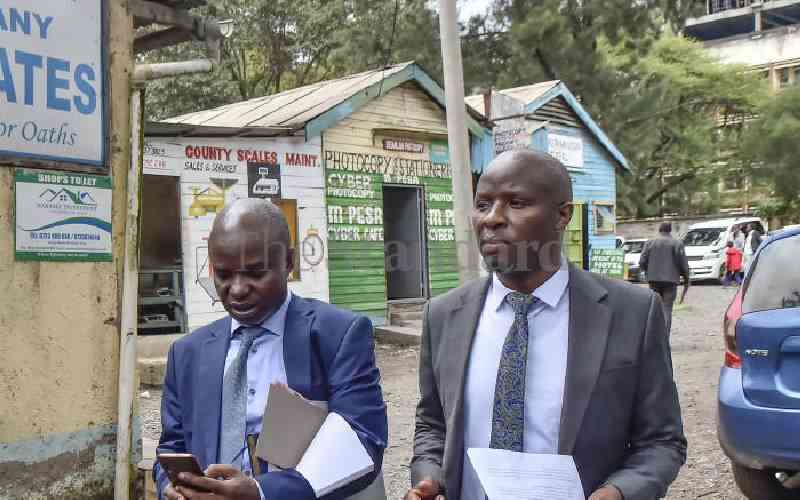By David Ochami
Nambale MP Chrysanthus Okemo, who is facing 15 money laundering and fraud charges in Jersey, now says he is ready to fight extradition to the UK island in Kenyan courts.
His lawyers hope to convince the Kenyan High Court that the Judiciary in Jersey is not free and that due to a lengthy lapse of time he is incapable of getting a fair trial.
The MP also argues that the proposed transfer of the case to the foreign court is unconstitutional and against public interest in Jersey itself.
They also intend to argue that the death of a key witness, David Piesold in 2008, has prejudiced the investigation against him and allege that the probe itself was done in utmost stealth manner, without his knowledge for he got "no opportunity to present his explanation", and that after a delay of about 13 years the case against him is "gravely" prejudiced.
Mr Okemo’s move came after it was reported that the Government is expected to start extradition proceedings this week for the MP and former Kenya Power and Lighting Company boss Samuel Gichuru.
Director of Public Prosecutions said the decision over the extradition request by the Chief Justice of Jersey would be made shortly.
Conflict of interest
On Sunday, lawyers for the former minister said they would raise a conflict of interest challenge to block his transfer to Europe by arguing that Tim Le Cocq, Jersey’s Attorney General since November 2009, was a partner in the Ogiers law firm in a suit Okemo’s co-suspect Gichuru brought against Walbrook Trustees. According to Okemo, Le Cocq was assigned to represent Ogiers in the suit. He claims the Jersey Judiciary is not free because "the three organs of state, that is the Executive, Judiciary and Legislature are all co-joined in the office of the Bailiff", an official he says is Chief Justice of the territory of 95,000 people besides being the president of its Court of Appeal and legislative assembly.
In the affidavit sworn by Ngatia and Associates Advocates on June 3, Okemo invites the High Court to declare that he cannot be extradited "by reason of time" since the alleged crime was committed, and that it will be unfair and unjust to send him overseas if the extradition is sought in bad faith against the interest of justice.
The former Finance and Energy minister also argues that the requested extradition breaches the so-called London Scheme of Extradition within the Commonwealth, which provides a framework for extradition within the Commonwealth.
He claims Jersey’s request is not made in good faith and interest of justice because the island whose banks the suspects reportedly used to launder money "has a financial interest" in this case or is anticipating gain.
Okemo also claims that if he committed any offence "the lawful venue for trial is in the Republic of Kenya", which he says has a legitimate interest in the alleged lost funds besides being the territory where the alleged crime took place or originated.
improper purposes
He also alleges that Jersey is motivated by "improper purposes" because she lost no money in the alleged swindle and adds that he cannot be transferred to the foreign territory because Section 4(1) of the Extradition (Commonwealth Countries) Act does not allow extradition in breach of the dual criminality rule.
Stay informed. Subscribe to our newsletter
Early last month, the High Court in Nairobi declined to listen to his challenge against the extradition because it was deemed premature since the Kenyan authorities had not yet begun the process to send him to Jersey.
But Press reports on Sunday indicated that lawyers at the State Law Office who have examined thousands of documents touching on Okemo and Gichuru are ready to commence extradition proceedings soon.
The Nambale MP and Gichuru face 53 counts of fraud, misconduct and money laundering charges, crimes allegedly committed between February 1, 1998 and June 28, 2002.
Challenging the extradition from Jersey, Okemo says the charges do not meet the dual criminality standard because when they were allegedly committed, Kenya had not enacted its Proceeds of Crime and Anti-Money Laundering Act.
Hence "money laundering was not a crime in Kenya (before 2009), according to the MP, who argues that it will be an abdication of "its State responsibility for Kenya to surrender its citizen to a foreign country for trial."
 The Standard Group Plc is a
multi-media organization with investments in media platforms spanning newspaper
print operations, television, radio broadcasting, digital and online services. The
Standard Group is recognized as a leading multi-media house in Kenya with a key
influence in matters of national and international interest.
The Standard Group Plc is a
multi-media organization with investments in media platforms spanning newspaper
print operations, television, radio broadcasting, digital and online services. The
Standard Group is recognized as a leading multi-media house in Kenya with a key
influence in matters of national and international interest.
 The Standard Group Plc is a
multi-media organization with investments in media platforms spanning newspaper
print operations, television, radio broadcasting, digital and online services. The
Standard Group is recognized as a leading multi-media house in Kenya with a key
influence in matters of national and international interest.
The Standard Group Plc is a
multi-media organization with investments in media platforms spanning newspaper
print operations, television, radio broadcasting, digital and online services. The
Standard Group is recognized as a leading multi-media house in Kenya with a key
influence in matters of national and international interest.





